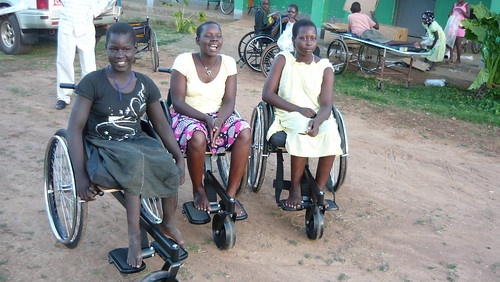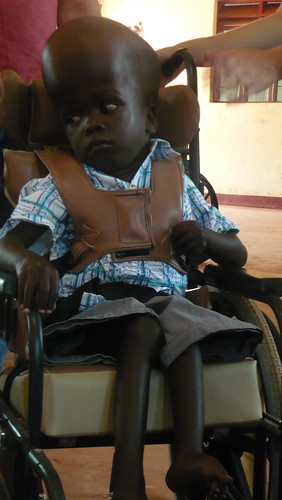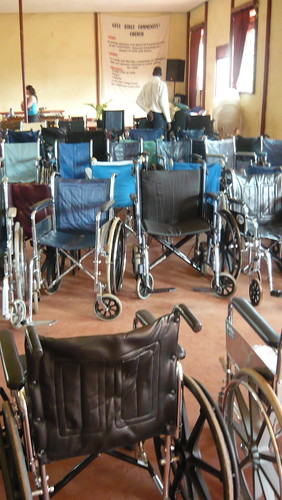As a disclaimer to the following, I’d like to start by saying that this is not an attack on donors…it’s not an ungrateful dismissal of people’s generosity…it’s not a childish tantrum that I wanted an orange lollipop when I got strawberry. When done right, donations (financial, in-kind, or otherwise) can truly be one of the most humbling ways for human compassion to shine, for both the giver and the receiver.
However, what happens when donations do more harm than good? When good intentions + poor assumptions of an organization’s needs + NGO’s fear of turning down donations = incomplete results? In the last few weeks with GDPU, several instances have come up where I smile through gritted teeth at the “impact” of donations.
A few weeks ago, Gulu received a generous donation of 50 wheelchairs from two organizations, one in Uganda and one from the states. A team of volunteers came to help assemble, fit, and distribute the wheelchairs. It was an empowering few days as most beneficiaries were receiving their first-ever wheelchair, a HUGE improvement from those who were accustomed to crawling on hands and knees. Some of the wheelchairs were especially excellent, as they were adjustable for children and had supportive headrests, a particularly important feature for children with Cerebral Palsy or hydrocephalus who may need more assistance to sit upright.

Three girls enjoy their new wheelchairs. These are examples of a great fit: not only do they fit each individual; the type of chair (large base + a large castor wheel out front) is ideal for Gulu's rough terrain.
Unfortunately, “great fits” were in the minority that day. Why?
a. “Second choice” chairs: Gulu received chairs after Kampala, meaning the best-quality chairs were already distributed. Maybe 60% of the chairs that made it to Gulu were hospital chairs. These are GREAT for wheeling somebody a short distance…but for people with spinal injuries they need more support than a fabric seat; people who have the ability to push themselves can’t have such armrests in the way of the wheels; anybody living in Gulu can’t use a chair like that on the mud roads here without risk of tipping, getting stuck, etc. Additionally, many hospital chairs are “one-size-fits all,” meaning they are often too big. In that case, the user has to overcompensate by leaning to one side; in turn, this leads to pressure sores and additional back problems (GDPU’s Fred, for example, was given a poor wheelchair after his accident as a teenager. He developed scoliosis because he favored his right side).
b. Informing and transporting people was difficult: Honestly, GDPU dropped the ball here, as mobilizing 50 people that they have a 2-day window to travel to Gulu for their new chair takes time and money that GDPU didn’t prepare for. For recipients (and their parents or caretakers), it takes money they don’t have to travel to Gulu. It takes proper transport that can carry a wheelchair home. It takes planning. They weren’t informed early enough, and in some cases, they weren’t able to come.
c. A “give away to anybody!” mentality: Poor mobilization and other challenges meant only SEVEN of 50 recipients showed up on Day 1 of Wheelchair Distribution. The volunteers doing the fittings were frustrated, and rightly so, as each chair takes time to assess and fit. But a mandate that “if people don’t start arriving soon, the chairs will go back to Kampala” caused a bigger scramble to make sure the chairs got to SOMEBODY, even if they weren’t on the original list. As a result, many recipients were from Gulu Municipality because they are close. Gulu town often takes priority over the villages because the concentration of demand is higher and the people are easier to access. Thus, the villages are often the last to receive aid.
I don’t have the perfect answer to this, but is it better to (a) ship wheelchairs from across the world or (b) invest that shipping money in Gulu to manufacture tailor-made chairs?
The other way that dependency on donations has manifested itself at GDPU – and, I’d imagine, many NGOs – is a “take what you can get” approach to soliciting funding. Having worked on multiple proposals and grants with GDPU, I can’t tell you how many times I heard “The donor wants to fund XYZ, not ABC, so let’s make sure we include a lot of X and leave out the B.” It’s the real-world version of “teaching to the test.”
But, what if GDPU would be better off with option B? What if PWD in Gulu could benefit, grow, and achieve MORE with B instead of X? Is GDPU really in a position to challenge the donor and say, “Thanks, but, here’s how your donation could REALLY make a difference…Here’s the type of programming this proposal really should support.” They are scared of angering the donor, so they ask for what they think they can get, rather than, maybe, what they need.
I’ll concede that donors have the right to give what they want and to request accountability. But shouldn’t they also donate responsibly to know WHY it is needed? Organizations should feel empowered to work WITH the donor to determine what is needed – and not face repercussions or risk rejection if their request differs slightly from the offer. Don’t hand me a Band-Aid if I tell you I have a headache.
Is an ill-fitting wheelchair better than no wheelchair at all? I don’t know…you’d have to ask the user. And I’m sure some of you are thinking, “Beggars can’t be choosers.”
But why do they have to be beggars? Why are recipients of donations less worthy of quality support than somebody who can pay for it? Why isn’t accessibility and movement a right, not a favor?
I don’t fault people for being desperate. I fault the system that isn’t supporting them to be otherwise.
Posted By Rebecca Scherpelz (Uganda)
Posted Aug 29th, 2011




5 Comments
Jan
August 29, 2011
Lack of communication seems to be the underlying issue here, Becca. I’m sure if I am donating money to a cause, I would expect the people administering the donations to understand the need and use my funds accordingly. I realize that in this sort of “remote donation,” I am very far from knowing what the “need” is and must rely on someone else. the other problem is that the “someone else” involves many layers of red tape, and we all know how that can go. The “give them away in a hurry or they’ll send them back to Kampala” is an understandable response in a frustrating situation. But it’s also frustrating for the donor…. who wanted their gift to make a genuine difference for someone.
Rebecca Scherpelz
August 29, 2011
Well said, Jan. You’re right, it does come down to communication. The necessity for accountability and reporting, while often a pain and a lot of red tape, is still important to earn, gain, and keep donor’s trust. If making a donation required an extra “step” of learning how it works or how it makes an impact, I worry that people might say, “nah, skip it. Not worth my time to donate.” That’s not the wish, because then both the donor and the receiver lose out…
Stephanie
August 29, 2011
Becca – I really appreciated your perspective on the importance of matching needs with donations. I too worry that sometimes those of us in the giving position, myself included, are more focused on our own intent than on the needs of the people we are intending to serve. I also wonder how donations are not merely a “good intentioned” act but in addition to the good intention and possible benefit to the recipient they also result in benefits to the donors. For example, I substantiate a good feeling about myself when I donate my time and money. Additionally, organizations and individuals enhance their reputations when they donate. If I am honest with myself, I am more likely to donate something that I don’t need or want for myself because I’m not using it. In these types of cases, it’s not really about my caring for others’ needs as it is attending to my own (clearing space in my house and making myself feel good for donating like a good person).
Thanks for raising some good questions related to the complicated arena of donations. I’ll keep thinking about this complex set of factors!
Rebecca Scherpelz
August 29, 2011
Great to hear from you, Stephanie! And thanks for your honesty about your role as a donor. I’m in the same boat, giving for all manner of reasons. I don’t think that necessarily makes the giving a bad thing or any less generous, as it is still giving someone’s time/money/things/life to another. Are you familiar with Avenue Q, the musical? It’s quite comical (and sometimes crass), but makes some pretty straightforward statements: “Every time you do good deeds, you’re also serving your own needs. When you help others, You can’t help helping yourself!” And really, if it’s a mutually enriching act, it’s a real blessing.
Martha Scherpelz
September 1, 2011
What an odd dilemma and one that I can tell is causing you frustration. Perhaps it is no different in many parts of the world, and in many areas of need. But I do hear your voice asking that the needs of the local people be the driving force, the deciding factor in the “nuts & bolts” of what happens at the grassroots level. It reminds me vaguely of a donation drive we had at church years ago – it was for homeless folks, so of course there were gifts of clothing, blankets, personal products. And then in the pile I saw a large box full of microwave popcorn. Sigh. Maybe it was used by someone who needed it, maybe it did make its way to a family who was both happy to have the treat and who owned a microwave. But I think those of us who are so richly blessed are sometimes just lacking in the knowledge or sensitivity of what is needed.
Becca – your writing is superb. It overflows with emotion and commitment and even in this piece written in frustration, there is a hopeful tone. You do make a difference.